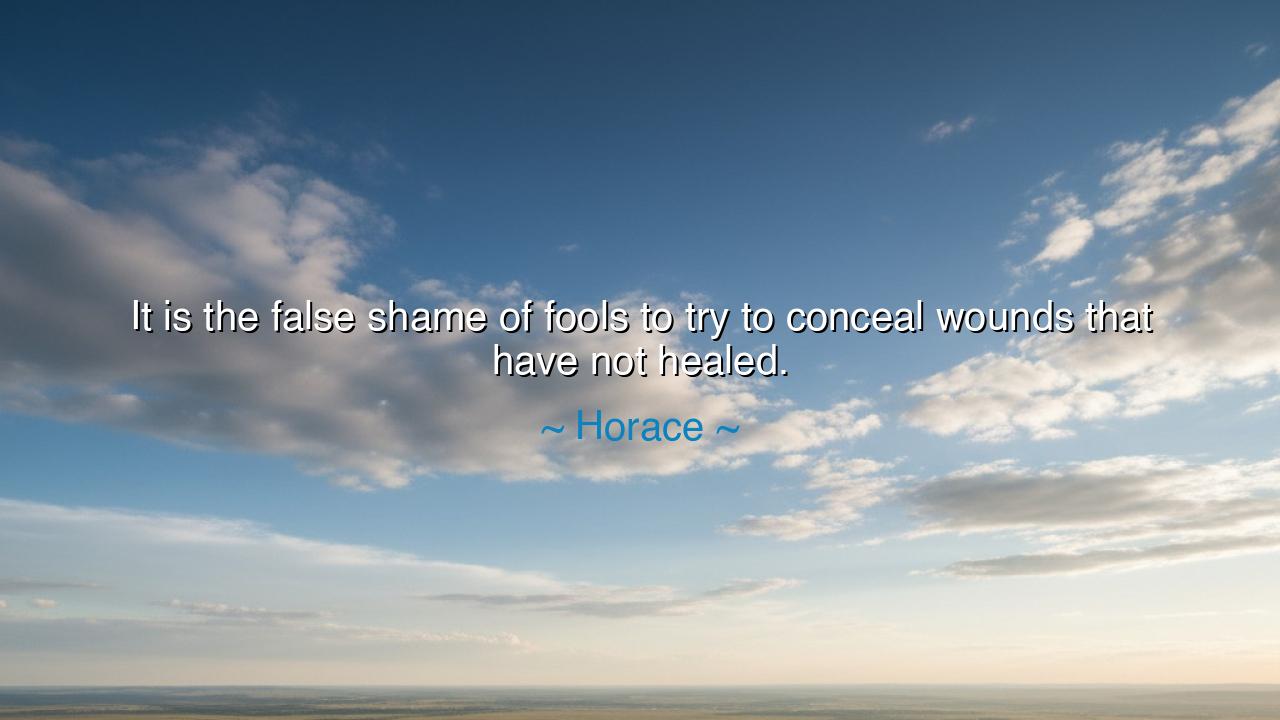
It is the false shame of fools to try to conceal wounds that






Horace, the Roman poet whose words have carried through centuries like echoes in a marble hall, once wrote: “It is the false shame of fools to try to conceal wounds that have not healed.” In this saying he unveils the folly of pride, that false armor which men and women wear to hide their pain. For wounds left untreated, whether of the flesh or of the spirit, do not vanish with silence. They fester in secret, poisoning strength, until the one who conceals them collapses beneath their weight. True wisdom lies not in pretending to be unbroken, but in seeking healing openly, in allowing truth to cleanse where shame would only corrupt.
The ancients often spoke of wounds, not only of the body but of the soul. The Greeks called upon Asclepius, the god of healing, knowing that to ignore illness was to invite death. Yet many today, as in Horace’s time, imagine it strength to suffer silently, to cover their scars with pride. But false shame is not strength; it is weakness disguised. The one who says “I am not wounded” while bleeding is a fool, for he betrays himself and denies himself the cure that might save him.
History gives us many witnesses to this truth. Consider the life of Abraham Lincoln. Throughout his years he battled deep melancholy, a wound of the spirit that might have consumed him. Yet he did not conceal it with pride; he confessed his struggles to his friends, he poured his heart into letters, and he allowed the weight of sorrow to deepen his compassion. In acknowledging his wounds, he gained strength. And that strength carried him through the torment of war, allowing him to bind a fractured nation.
Contrast this with leaders and kings who concealed their weaknesses. Many Roman emperors, too proud to confess error, too vain to admit need, fell into ruin. Their hidden wounds of arrogance and cruelty grew unchecked, destroying both themselves and their empires. Horace, who lived among them, knew well the danger of wounds concealed. For the fool hides his pain and is destroyed by it; the wise man reveals his wound and is healed.
To confess a wound—whether of the heart, the mind, or the body—is not disgrace, but courage. It is to say, “I am human, and I bleed, but I also seek healing.” The healed scar becomes a mark of survival, a sign of strength greater than denial. Those who conceal their wounds may appear strong for a moment, but like a cracked wall hidden by paint, they crumble when the storm comes. Those who reveal their wounds and tend to them endure, for their foundation is honest and true.
The lesson, children of tomorrow, is this: never let shame prevent you from seeking healing. Do not hide your wounds behind masks of laughter, pride, or silence. Speak them, share them, seek counsel, seek comfort. For in the open air wounds can breathe, and in the light they can close. To conceal them is folly; to confess them is wisdom. The scar that follows confession is not shame—it is honor.
Practical action flows naturally: When you are hurt, acknowledge it. If the hurt is of the body, seek medicine. If the hurt is of the heart, seek a friend, a guide, or a prayer. Do not let pride forbid you from tending to your pain. Write your wounds upon paper, speak them aloud, or share them with those you trust. And when another reveals their wound, do not mock them—honor them, for they have chosen wisdom over folly. In this way, you live out Horace’s truth: to conceal wounds is the shame of fools, but to confess and heal them is the strength of the wise.






AAdministratorAdministrator
Welcome, honored guests. Please leave a comment, we will respond soon